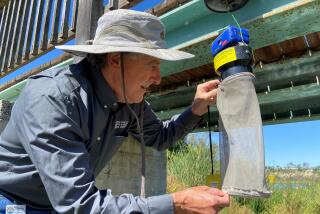Blood Supplies Free of West Nile, Officials Say
- Share via
Health officials said Sunday that they believe the nation’s blood supply is safe from West Nile virus, even though they are aggressively investigating what might be the first known transmission of the disease through tainted blood or tissues.
The federal Centers for Disease Control and Prevention in Atlanta was rushing blood and tissue specimens Sunday from various donors to a laboratory in Fort Collins, Colo., to try to determine whether a woman who died Aug. 1 in a Georgia car accident was a carrier of the West Nile virus and, if so, how she contracted it.
The woman donated four of her organs. One of the recipients, a 71-year-old man, died Thursday of encephalitis, a swelling of the brain that is the most severe of the virus’ possible symptoms. Two other recipients appear to have encephalitis, and the fourth has a fever, CDC officials said.
James Hughes, director of the CDC’s National Center for Infectious Diseases, said Sunday that the organ donor received numerous blood transfusions before she died. He said the CDC hopes to determine whether she contracted West Nile virus from those transfusions.
In addition, he said, the CDC and health officials in Georgia and Florida are trying to determine whether the four transplant recipients have the virus and, if so, how they contracted it. So far, only one of the organ recipients has a confirmed case of the disease. But the man who died Thursday also tested positive for exposure to flavivirus, the family to which West Nile belongs, Hughes said.
All 638 known cases of West Nile in the United States this year, including 31 deaths, are believed to have resulted from mosquito bites.
Hughes said blood banks have been ordered to withdraw all blood products from donors whose blood was transfused into the Georgia woman. A Georgia health official said some of those products already have been transfused into other people. Investigators have obtained specimens from about two-thirds of the donors involved.
If it turns out that West Nile virus was transmitted by blood or tissue products, the CDC will work with researchers to develop a “rapid, sensitive and specific” test for West Nile virus in blood, Hughes said.
No such test currently exists.
More to Read
Sign up for Essential California
The most important California stories and recommendations in your inbox every morning.
You may occasionally receive promotional content from the Los Angeles Times.













